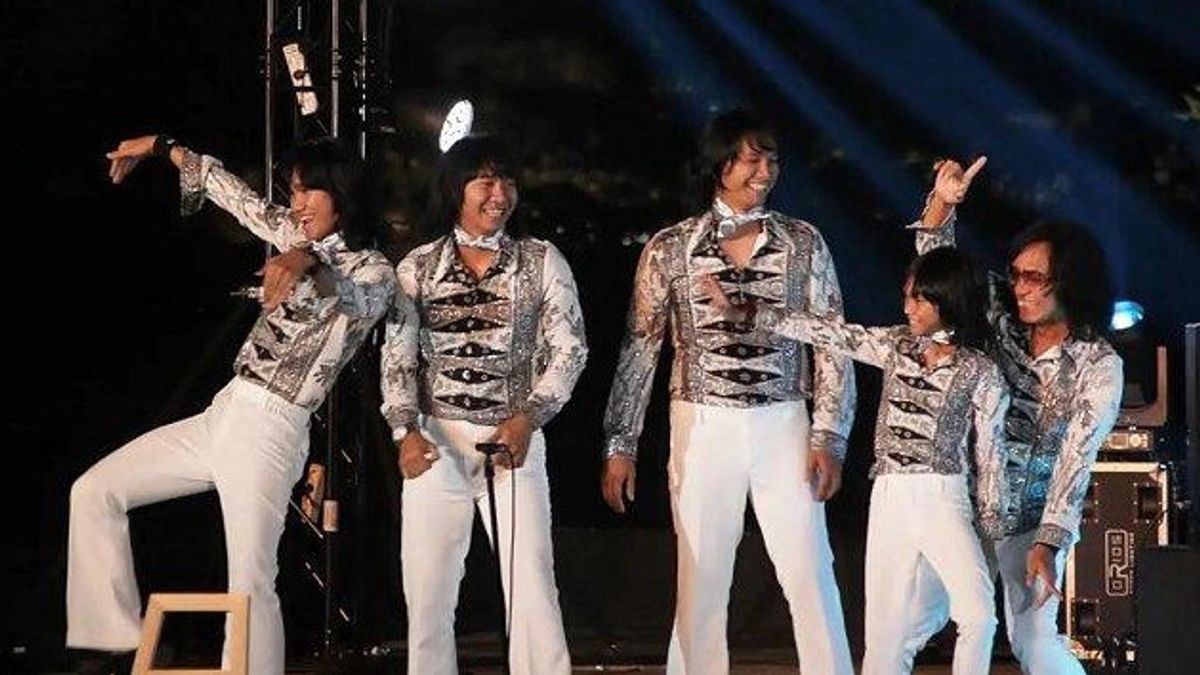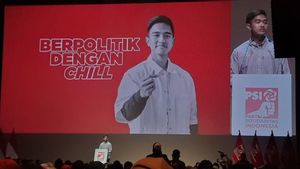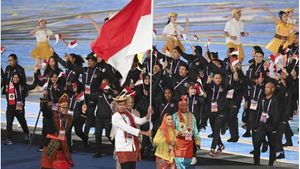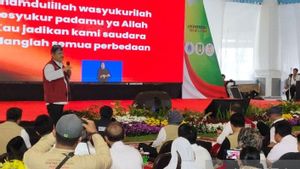JAKARTA - The band T'Koes has been the talk of Indonesian music lovers for the past week. This happened after the Koes Plus extended family prohibited the band from performing Koes Plus' songs.
"That as of today, the Koes Plus extended family prohibits and does not give permission to the T'Koes band to perform creative works from the Koes Plus extended family, and anything related to musical activities and/or in any form, whether commercial or non-commercial, " said Sari Koeswoyo in Jakarta, Saturday, September 23.
Royalty and ethical issues are said to be the reason the Koes Plus extended family forbade the T'Koes band from singing the legendary band's songs.
The existence of T'Koes then made the public aware that there are quite a lot of bands or musicians who actually dedicate their musical careers by singing other people's songs, or what are better known as tribute bands.
Difference between Tribute and Cover Bands
T'Koes was founded in 2007 by a big Koes Plus fan named Agusta Marzall. T'Koes personnel consist of three brothers, namely Fajaru Al Azhari, Galifa Al Baladi, and Ji Qory Al Ghifari. Plus Agusta Marzall who is the father of the three brothers.
Throughout their career in the music world for almost two decades, the T'Koes band has almost always performed songs that were popularized by Koes Plus. So you could say, they are a tribute band.
Quoted from protributebands.com, tribute bands are those who only focus on singing music from one band or artist. When performing, tribute artists focus entirely on recreating the experience of listening to the original musicians.
Tribute artists do not only circulate in Indonesia. Even abroad, tribute bands are popping up. Just like T'Koes who paid 'tribute' to Koes Plus, overseas the tribute band that is quite popular is Live Wire which is an AC/DC tribute band or recently there is Hybrid Theory, a Linkin Park tribute band.
The name Hybrid Theory has become increasingly well-known to music lovers, especially Linkin Park fans, in the last two years. This band from Lagos, Portugal, even held a tour in America, Europe, and Australia which was witnessed by thousands of Linkin Park fans.

Tribute band and cover band are different. Even though they sound similar, these two terms have differences.
“When you see a cover band perform, you can hear a variety of popular songs.
According to music observer Mudya Mustamim, the emergence of tribute bands is a natural thing. With tribute concept bands singing popular songs, it will be easier for them to attract the public's attention.
"I think this is normal because usually tribute band members are based on their liking for a particular singer or band.
"Apart from that, as a band with a tribute concept, bringing songs that are already known to many people is much easier to attract attention, and has more commercial potential."
Ethics for Tribute Band
In the midst of the proliferation of cover and tribute bands in the world of music, another problem has emerged.
Reportedly, T'Koes ignored royalty payments and permission to perform songs, although this is said by the Koes Plus family to be not entirely true.
According to Mudya, implementing regulations regarding song copyright in Indonesia is still difficult to realize because basically, the music industry is very complex. However, this is different from what happens abroad.
"Abroad, especially in Europe and America, as far as I know, a tribute band usually gets special permission or gets official approval from the band they imitate," explained Mudya.
"If we talk in a foreign context, usually they have special permits for concerts, etc.

Mudya continued, performing a song without asking permission from the original singer is actually not against the law, as long as the tribute or cover band fulfills its obligation to pay royalties through the National Collective Management Institute (LMKN). This is stated in Article 23 paragraph (5) and Article 87 paragraph (4) of Law 28/2014 as well as Government Regulation (PP) No. 56 of 2021 concerning Management of Song and/or Music Copyright Royalties, a person may perform a song without permission.
In article 23 paragraph 5, it is emphasized that anyone can make commercial use of a work in a performance without first asking permission from the creator by paying compensation to the creator through LMKN.
However, unfortunately, Mudya admitted that the issue of royalties is still controversial because many musicians question the transparency of the royalty collection system. Apart from that, quite a few people have problems regarding the size of the nominal royalties.
"So what T'Koes did by singing Koes Plus songs did not violate the law or was not illegal as long as it fulfilled the obligations mentioned in the previous paragraph," said Mudya.
"So once again, especially with regard to T'Koes and Koes Plus, there is actually no need to ask for permission as long as you comply with the legal regulations (paying royalties). But in our country - as is the case with the band Hybrid Theory in the US - ethics is something that cannot be ignored. "In this case, of course, ask permission or blessing from Koes Plus, in addition to paying royalties," he concluded.
VOIR éGALEMENT:
The English, Chinese, Japanese, Arabic, and French versions are automatically generated by the AI. So there may still be inaccuracies in translating, please always see Indonesian as our main language. (system supported by DigitalSiber.id)














